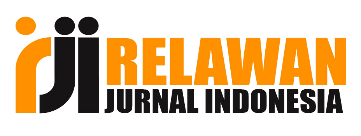Peningkatkan Hasil Belajar Siswa Pada Mata Pelajaran Matematika Materi Integral Melalui Penerapan Model Group Investigation
DOI:
https://doi.org/10.32672/jkk.v2i4.127Abstract
Penelitian ini bertujuan untuk meningkatkan kualitas dan proses pembelajaran Matematika materi Integral di kelas XII MIPA-1 SMA Negeri 2 Timang Gajah Tahun Pelajaran 2019/2020 melalui penerapan model group Investigation. Meningkatkan partisipasi belajar siswa pada mata pelajaran Matematika dengan materi Integral melalui penerapan model group investigasi di kelas XII MIPA-1 SMA Negeri 2 Timang Gajah Tahun Pelajaran 2019/2020. Dan Meningkatkan hasil belajar siswa pada mata pelajaran Matematika dengan materi Integral melalui penerapan model group investigasi di kelas XII MIPA-1 SMA Negeri 2 Timang Gajah Tahun Pelajaran 2019/2020. Dalam penelitian ini penulis mengambil lokasi di SMA Negeri 2 Timang Gajah pada mata pelajaran Matematika pada tahun pembelajaran 2019/2020. Subjek Penelitian adalah seluruh siswa kelas XII IPA SMA Negeri 2 Timang Gajah Tahun Pelajaran 2019/2020 sebanyak 27 siswa terdiri dari 10 laki-laki dan 17 perempuan. Penelitian ini dirancang 2 siklus. Alat pengumpulan data dengan pendekatan obesrvasi, tes dan dokumentasi. Analisis data adalah melihat tingkat ketuntasan individu dan klasikal setiap siklus penelitian. Hasil belajar siswa dalam pembelajaran dinyatakan berhasil jika 85% jumlah siswa tuntas belajar, dengan KKM 70. Hasil penelitian menunjukkan Penerapan model Group Investigasi pembelajaran Matematika materi Integral dapat meningkatkan partisipasi belajar siswa. Hal ini terindikasi dari peningkatan aktivitas belajar menunjukkan peningkatan dari 11 siswa atau 38,10% pada studi awal menjadi 18 siswa atau 71,43% pada siklus pertama dan 27 siswa atau 100% pada siklus terakhir. Serta dapat meningkatkan ketuntasan belajar pada sisklus kedua 90,48%.
Downloads
Published
How to Cite
Issue
Section
License

This work is licensed under a Creative Commons Attribution 4.0 International License.
Copyright and License Agreement
- The author(s) owns the copyright and other proprietary rights associated with the article.
- The author(s) has the right and is permitted to use the substance of the article for the author's subsequent works, including for the purposes of lectures and books.
- The author(s) grants the first publication rights to the journal under a Creative Commons License (CC BY 4.0).
Creative Commons CC BY 4.0 License Statement
You are free to:
- Share — copy and redistribute the material in any medium or format;
- Adapt — remix, transform, and build upon the material
for any purpose, even commercially.
The licensor cannot revoke these freedoms as long as you follow the license terms.
- Attribution — You must give appropriate credit, provide a link to the license, and indicate if changes were made. You may do so in any reasonable manner, but not in any way that suggests the licensor endorses you or your use.
- No additional restrictions — You may not apply legal terms or technological measures that legally restrict others from doing anything the license permits.











